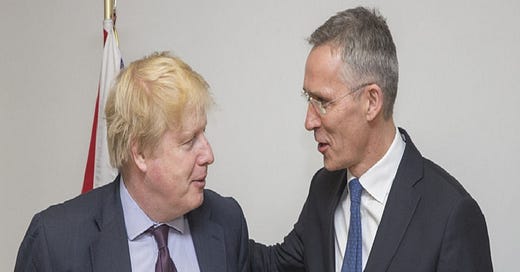Johnson & Stoltenberg’s Rallying Of The West Around Kiev Belies A Lack Of Confidence
These contrasting grand strategic interests explain the widening rift within the West over supporting Kiev, and nothing that Johnson or Stoltenberg wrote in their seemingly coordinated articles on Saturday will convince their French, German, and Italian counterparts to reconsider their speculative efforts to pressure Zelensky into agreeing to a ceasefire sooner than later.
British Prime Minister Johnson and NATO Secretary General Stoltenberg both attempted to rally the West around Kiev in articles that they each published on Saturday. This coordinated perception management campaign belies a lack of confidence, however, since it wouldn’t have been commenced had the West solidly been united behind that former Soviet Republic. Two top military officials from that country also recently hinted in an interview with the world’s leading military-industrial complex magazine that the West’s solidarity is wavering so they’re now concerned that some governments might not greenlight their latest arms requests. All of this follows the official narrative on the conflict decisively shifting after politically inconvenient facts about Kiev’s high attrition rate finally became public.
The French, German, and Italian Prime Ministers also visited Kiev last week too, during which time there was speculation that they floated a ceasefire proposal with Zelensky. These rumors were extended credence after his Foreign Minister wrote in an article shortly afterwards that “The West must therefore not suggest peace initiatives with unacceptable terms and instead help Ukraine win” and one of his senior advisors admitted that some countries “don’t want a complete defeat of Russia. They want to force Russia to negotiate in order to achieve peace.” Quite obviously, Western unity over Kiev’s cause is cracking, which is prompting panic in that country that the foreign support upon which it’s now entirely dependent might soon dry up.
This explains the urgency with which Johnson and Stoltenberg commenced their perception management campaign over the weekend since those two leaders are keenly aware that some European countries like the “Big Three” whose Prime Ministers just visited Kiev are doing a lot less for Ukraine than others just like former US President Trump recently noted. Their articles come off as over-defensive and hint that the West is more fatigued with Kiev than many of its critics might have thought, which is why they tried convincing the public to support that country for years to come. It’ll likely be all for naught, however, since more Europeans favor peace over punishing Russia according to the latest survey from the European Council on Foreign Relations.
Zelensky has overexposed himself to such a degree with his daily media appearances across the world that many folks have grown numb to his pleas for more support, which a growing number don’t even want to provide since they’re much more concerned about the food and fuel crises that are destabilizing their countries’ economies. Johnson and Stoltenberg’s lobbying on their proxy’s behalf isn’t going to win hearts and minds among a population that’s already become weary of the conflict as it stretches into its fourth month. Those two have self-interested reasons in indefinitely prolonging the conflict related to London’s proposed alliance with some of the Polish-led “Three Seas Initiative” states and NATO’s role in the global military-industrial complex, hence why their leaders were warmongering again this weekend.
The ”Big Three”, by contrast, can’t wait for the conflict to end since they’re eager to economically colonize Ukraine according to the scheme that Zelensky proposed during last month’s Davos Summit when he offered them “to take patronage over a particular region of Ukraine, city, community or industry.” These contrasting grand strategic interests explain the widening rift within the West over supporting Kiev, and nothing that Johnson or Stoltenberg wrote will convince their French, German, and Italian counterparts to reconsider their speculative efforts to pressure Zelensky into agreeing to a ceasefire sooner than later. As they continue working towards that goal, it should be expected that the intra-Western rift will become more visible and increasingly difficult to deny.




